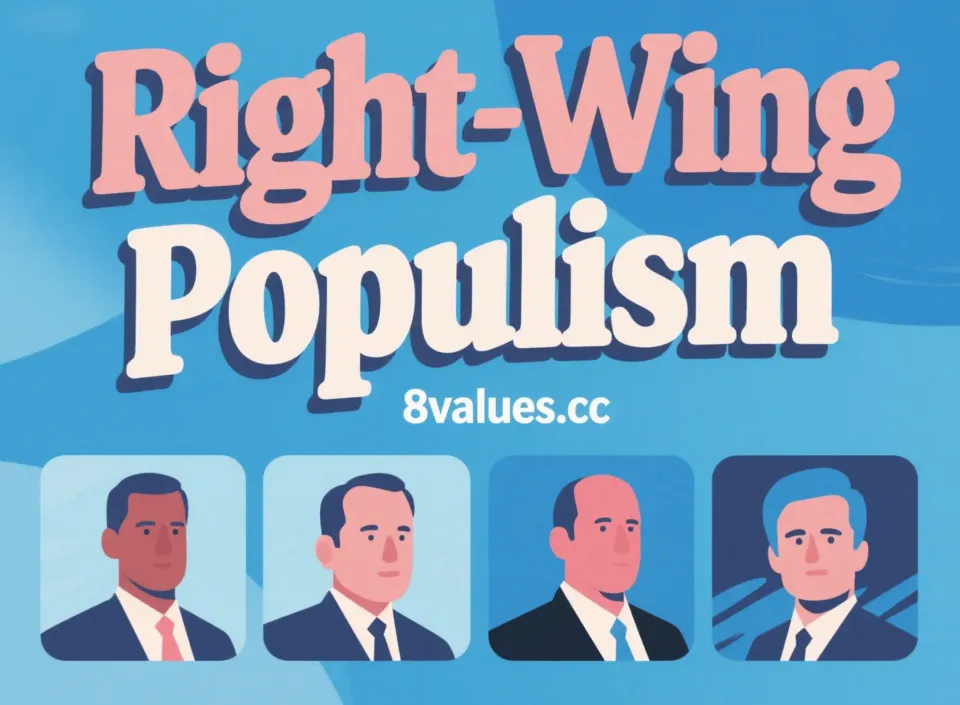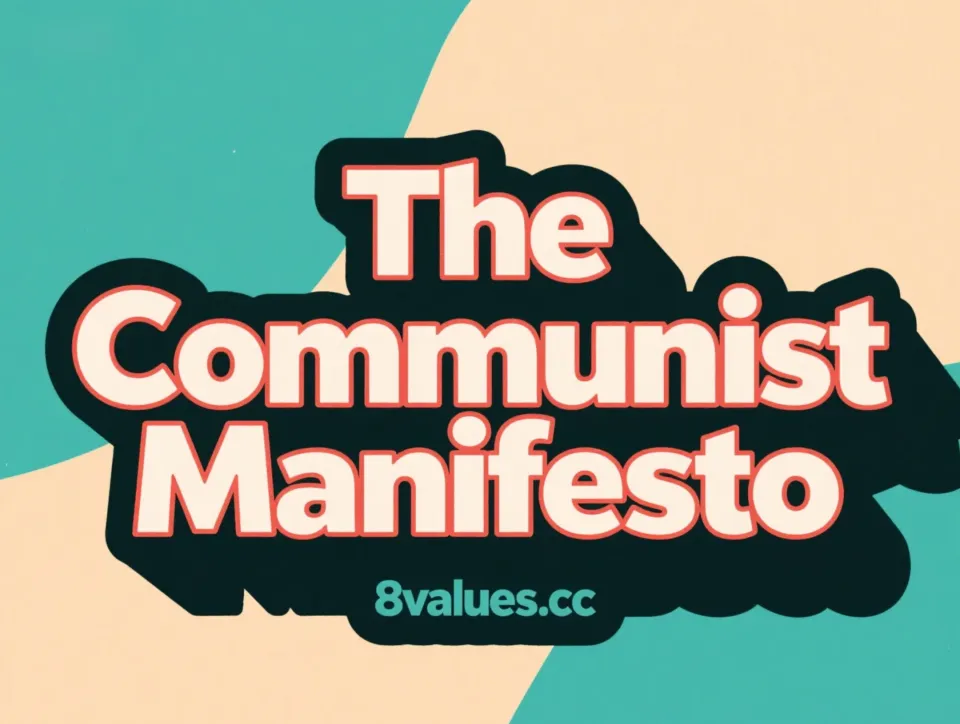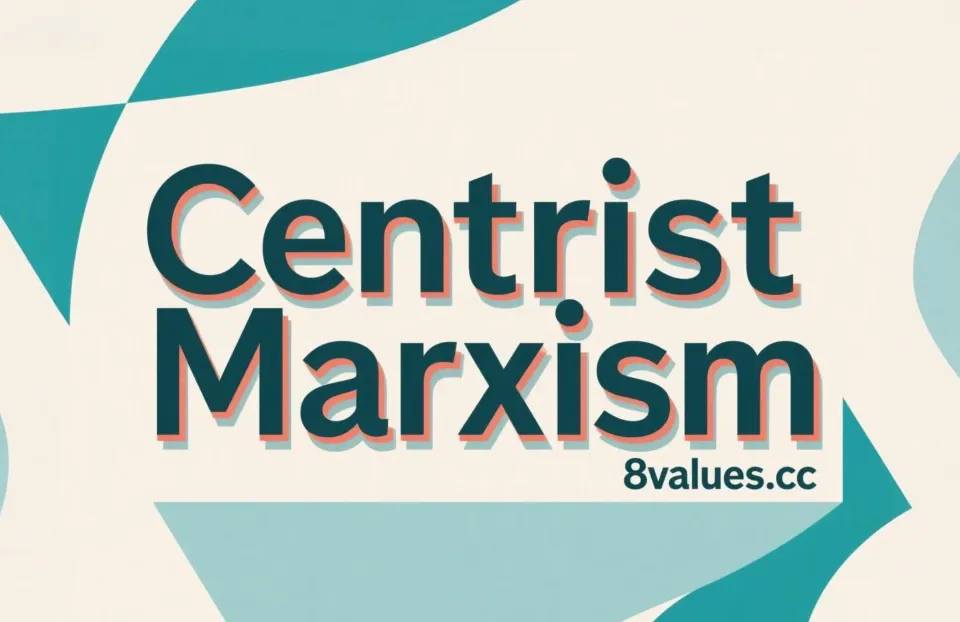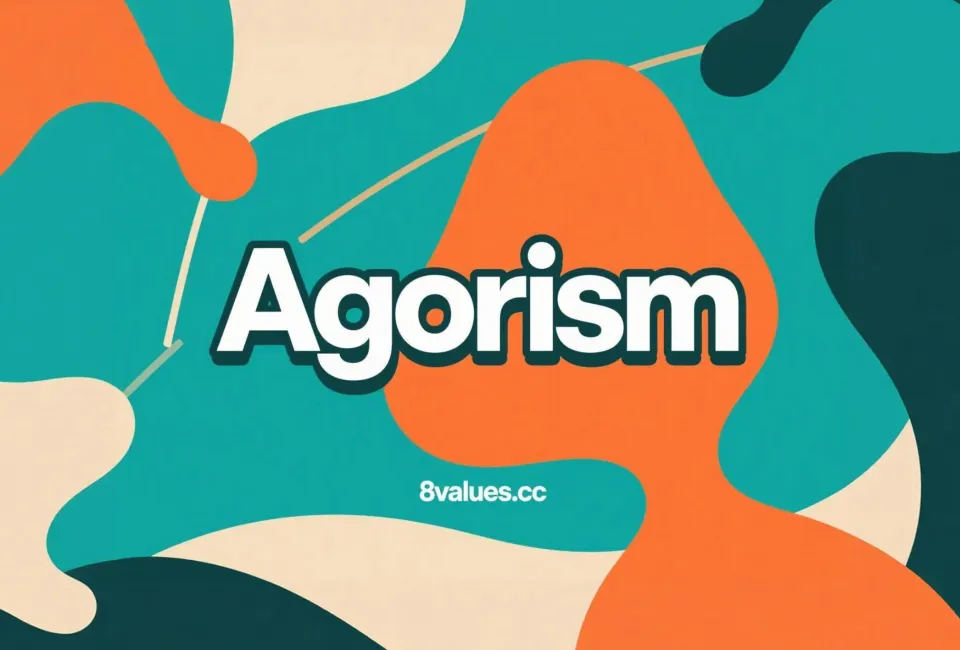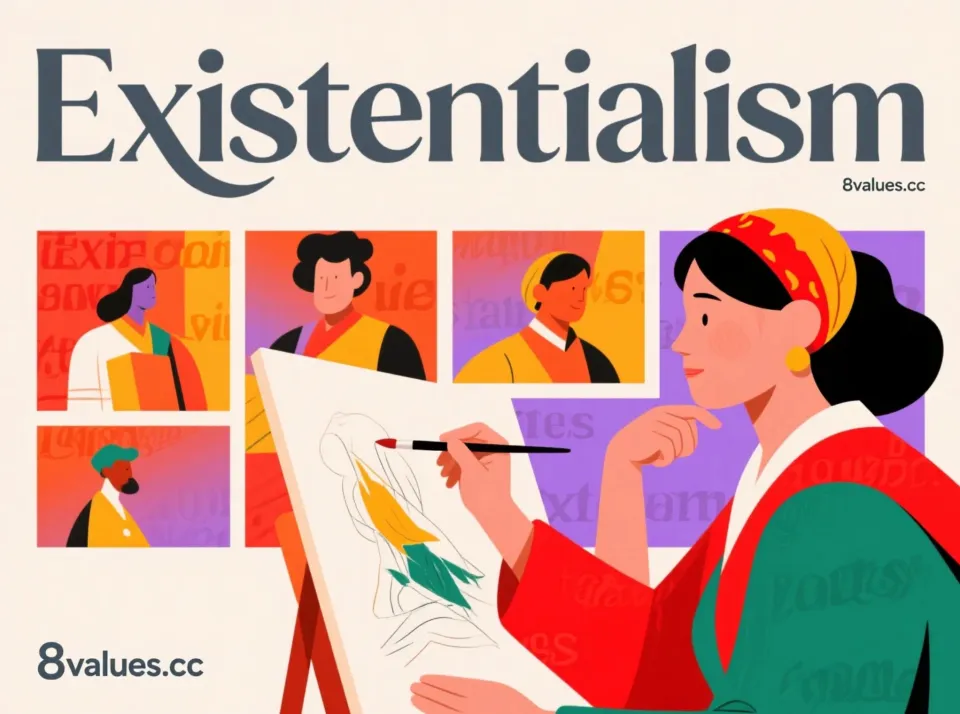Right-Wing Populism | 8values Interpretation of ideological ideology in political tests
This article will take you to fully understand the complex and changing political ideology of Right-wing Populism, and explore its core characteristics, historical evolution, global cases and far-reaching impact on democratic politics. Through the eight values political tendency test, you can better understand your own and the positioning of various political ideas.
In today's rapidly changing global political landscape, the term "populism" frequently appears in the public eye, especially "right-wing populism". It is not just a label, but also a complex phenomenon that profoundly affects political power and social foundation. Right-wing populism is a political ideology that combines right-wing political stance with populist rhetoric and themes. It usually displays anti-elite sentiment, opposes the existing order considered to be the "establishment" and claims to represent the interests of the "ordinary people." This political trend has been growing and growing over the past few decades, and its influence has gradually taken root in most European societies in the fluctuations, changing the party system and even subverting the foundation of democracy. This article aims to comprehensively analyze all aspects of right-wing populism, including its core definition, historical evolution, drivers, diverse manifestations, and potential challenges to liberal democracy.
The core definition and basic characteristics of right-wing populism
Right-wing populism is often called National populism or Right-wing nationalism. It is a political philosophy that rejects existing political consensus and combines right-wing politics with anti-eliteism.
The dual opposition between "people" and "elite": the universal logic of populism
The core concept of populism lies in building a conflict between the "pure people" and the "corrupt elite". This division does not simply describe the current social situation, but has profound moral connotations and is actively constructed by populists. Populism claims that society is ultimately divided into these two homogeneous and opposing groups and believes that politics should be an expression of the “universal will of the people” without being restricted by human rights or constitutional guarantees. Right-wing populism also inherits this binary opposition logic of "people vs. elites".
Right-wing background: nativism, nationalism and traditional values
Right-wing populism is called "right" because it rejects social equality and radical government programs, opposes social integration, and implies Nativism. Nativism is an xenophobic form of nationalism, advocating that "the state should be exclusively inhabited by members of the 'indigenous group' (i.e., 'nation'), and non-indigenous elements (personnel and thought) pose a fundamental threat to the homogeneous nation-state."
Recurring themes of right-wing populism include neo-nationalism , social conservatism , economic nationalism and fiscal conservatism . They are often intended to defend national culture, identity and economy against so-called attacks from "external forces." Many right-wing populists also explicitly condemn Islam's threat to the overall cultural heritage of its country.
Compounding and strategic: a flexible and changeable political style
Populism is a compound and flexible ideology that can integrate with the remnants of traditional political culture and is also a strategy to gain power. Once on the stage, it evolved into a "political style." Due to its "thin" ideological traits, populism can be attached to various dissatisfactions, both economically and culturally. This adaptability is the key to its widespread dissemination. While right-wing populists are not necessarily extremists, extremism is often combined with populism.
The global rise and evolution path of right-wing populism
Populism has been on the rise over the past few decades, although the prominence of such parties and movements fluctuates over time. In recent years, several right-wing populist parties have achieved remarkable election success.
Historical roots and modern waves: the catalysis of financial crisis and immigration waves
The term populism rose in the late 19th century, especially in the United States and Russia, with specific movements challenging existing power structures and representing the interests of the “ordinary people”.
However, since the 2008 financial crisis and the 2015 refugee crisis, support among right-wing populist parties in Europe has increased significantly. These developments come at the expense of mainstream parties: the average election score of right-wing populist parties has steadily increased, while the mainstream left and right support rates have declined.
Geographical differences: from Western Europe to North America to Asia
Right-wing populism is not a single whole, it has different characteristics in different countries. Nevertheless, its rapid spread across the globe, or at least among democratic countries, is worthy of attention.
- Europe : Poland, Hungary, Switzerland, Denmark, Austria, Finland, France, Italy, the Netherlands, Norway, Latvia, Sweden and Germany all have significant election successes. Populists in Hungary, Poland and the Czech Republic are currently in power. Right-wing populist groups, politicians and political parties in Europe are often known for their opposition to immigration (especially those from the Islamic world) and Euroscepticism.
- America : In the United States, right-wing populism has been a major political force within the Republican Party since the 2010s. Donald Trump won the 2016 and 2024 U.S. presidential elections, which was based on the theme of right-wing populism. Brazil's Jair Bolsonaro is also often described as a right-wing populist politician. The Conservative Party and the Quebec BJP also include right-wing populist factions. President Javier Milei of Argentina is also a typical right-wing populist.
- Asia Pacific : India's ruling Bharatiya Janata Party (BJP) and its leader Narendra Modi are often described as right-wing populism. Australia's One Nation and some Japanese parties also have right-wing populist characteristics.
Power Consolidation: From the Edge to the Mainstream
Many right-wing populist parties have successfully integrated into their respective political systems, gaining the opportunity to govern or becoming formal partners. For example, the Northern Union of Italy (Lega), the Liberal Party of Austria (FPÖ), the Law and Justice Party of Poland (PiS), the Fidesz of Hungary and the Danish People's Party (DF) have all ruled or played an important role. This phenomenon shows that the "epidemic prevention line" used by traditional mainstream parties to exclude extremist parties has begun to collapse in some countries.
Deep social factors driving the rise of right-wing populism
The rise of right-wing populism is a complex result of the interaction between factors such as economy, culture, politics and media.
Economic Insecurity: Lost and Inequality under Globalization
Economic issues are undoubtedly part of their rise, such as inequality, job insecurity, unemployment caused by deindustrialization or automation, the impact of globalization and the impact of the 2008 crisis. Rather than objective inequality, it is a perception of inequalities - social mobility is blocked and dissatisfied with the economic system, which seems more critical. People with low career mobility are more likely to develop anti-immigration and anti-globalization mentality, thus supporting the philosophy of populist parties. Many voters are generally concerned about employment security, working conditions, unemployment risks, equal opportunities, housing and medical care.
Cultural Identity Crisis: The Impact of Social Change and Multiculturalism
The rebound at the cultural level, especially in response to social progress and change, multiculturalism, changing gender roles, LGBTQ+ rights, and secularization, is an important theme in mobilizing right-wing populism. Concerns about immigration and the feeling that national identity is diluted are also powerful mobilization themes.
Lack of political trust: disappointment with establishment and mainstream parties
The decline in disillusionment and trust in mainstream parties, politicians and institutions, as well as perceptions of the failure of existing parties to represent public concerns, has also promoted the rise of right-wing populism. Some observers believe that the center-left and center-right parties have become too similar, and also provide space for populism. In Europe, concerns over national sovereignty and the restrictions imposed by the EU have also been the main factor.
Communication strategies in the digital age: conspiracy theories and information cocoons
Changes in the media environment, especially the rise of social media, have enabled populists to bypass the filtering of traditional media, communicate directly with the public, and form an "echo chamber" effect. In addition, the right-wing populist movement also used “troll science” (i.e., “distorted scientific arguments incorporated into populist discourse”) to create alternative narratives. Conspiracy theories, rumors and false information are also often exploited by populist movements, especially in the digital age, where the production and dissemination of content have become more convenient. This leads to the association between right-wing populism and post-truth politics.
The multi-ideological spectrum of right-wing populism
Right-wing populism is not a single phenomenon with a distinctly unified character; it takes different forms based on the specific history, political system, and culture of the country.
From center right to extreme right: internal differences and "welfth chauvinism"
Right-wing populism varies greatly in the political spectrum, from the center right (such as Silvio Berlusconi’s Italian Power Party) to the far right (such as the National Union of France), and even neofascism (such as the Golden Dawn of Greece). However, many right-wing populists reject any classification and claim to speak out “in the name of the people.”
Right-wing populists also have differences on socio-economic issues. For example, neoliberals in Switzerland, the Netherlands and Scandinavia have less dissatisfied with globalization, and they seek support from workers and the middle class by promising tax cuts to the middle class. Populists in France, Poland and Hungary oppose globalization and advocate protectionism.
A common point worth paying attention to is welfare chauvinism . Many right-wing populists support welfare states but advocate that social welfare be reserved only for their own citizens. This is a political strategy that combines welfare appeals with xenophobic information.
Variations of nationalism: Citizen nationalism and ethnic nationalism
Right-wing populism also differs in the application of nationalism.
- Civic Nationalism : Some right-wing populist parties in Western Europe adopt the normalization strategy of civic nationalism . They view culture as a question of values and argue for exclusion of certain groups based on ideological reasons rather than biological attribution. For example, by portraying Muslims as a threat to European and Western liberal democratic values, they avoided the direct use of racist labels. France's National Union is a typical example of this strategy, which rejects Islamic values based on secularism and emphasizes French republicanism and sovereignty. The UK Independence Party (UKIP) also supports an inclusive concept of British nationality based on shared citizenship and values.
- Ethnic Nationalism : By contrast, right-wing populist parties in Eastern Europe remain largely ethnic nationalists , focusing on the standards of national ownership and mobilizing voters based on socially conservative stances and rejection of minority rights. Both the Polish Party of Law and Justice (PiS) and the Hungarian League of Youth Democrats (Fidesz) fall under the category of "ethnic populism", which defines nations as ethnic/cultural communities, emphasizing national unity and homogeneity.
Economic Position: Blur the Boundary between Protectionism, Market Freedom and State Intervention
Right-wing populist parties often have contradictory commitments on economic issues, both liberal and socialist, to attract voters from different backgrounds.
- Protectionism and Economic Nationalism : Many right-wing populists blame the wealth gap caused by globalization on neoliberal policies and advocate economic protectionism. For example, the US "Make America Great Again" (MAGA) movement promoted trade protectionism. Finland's "True Finnish Party" is a strong economic nationalist party, opposing the free market economy and supporting welfare and protectionism.
- Market freedom and state intervention : Some right-wing populist parties, such as the Northern Alliance (Lega) in Italy and the Vox of Spain, were originally economic liberal parties, advocating tax cuts and reducing state intervention. However, during his reign, the Northern Alliance also implemented a pro-wealth policy. This reflects the "blurring pattern" of its economic policies, often swinging between free markets and state intervention.
The challenge of right-wing populism to liberal democracy
The relationship between right-wing populism and liberal democracy is complex and full of tension.
Anti-pluralism and the erosion of checks and balances of power
The core logic of right-wing populism, especially its anti-pluralism stance, poses a serious threat to liberal democracy. Populists claim to be the only legitimate representative of public opinion, often attacking checks and balances that protect liberal democracy, such as independent courts, free media and supervisory bodies. They tend to pursue a "majoritarianism" in which the will of the people is above the protection of minorities. This can lead to "discriminatory legalism", which uses the law but treats opponents or minorities in an unfair way.
Inciting polarization and the disintegration of social cohesion
Right-wing populism has exacerbated social polarization by portraying opponents as “the enemy of the people.” This can damage the quality of public debate and make rational arguments give way to simplified, emotional appeals and attacks on experts. In right-wing populism, especially, by highlighting identity dissatisfaction and sometimes minority groups as scapegoats, it can seriously undermine social cohesion. These factors interact with each other, which may lead to the rise of populism, erode trust, and further consolidate its position.
Analysis on the similarities and differences between right-wing populism and far-right
Right-wing populism and Far-right overlap in the political spectrum, but there are key differences in core ideology, policy propositions and political strategies.
The difference between core ideology and policy propositions
| Dimension | Right-wing populism | The far right |
|---|---|---|
| Anti-eliteism | Emphasizing the opposition of "people vs. elites", but not necessarily completely denies the democratic system | More radical, potentially directly challenging democratic institutions (such as authoritarian tendencies) |
| Nationalism | Emphasizing "national priority" may accept limited multicultural culture | Extreme xenophobia, advocating racial or cultural purification (such as white supremacy) |
| Anti-establishment | Criticize the existing political system, but may participate in elections | Probably reject the existing political order completely, or even support violent means |
| Economic Policy | Mixed protectionism with market freedom (such as Trump’s tariffs + tax cuts) | More inclined to economic nationalism or state control (such as Nazi Germany's economic control) |
| Immigration Policy | Advocate restriction of immigration, but may accept skilled immigration | Advocate a complete ban on immigration and even promote ethnic cleansing |
| Social and cultural policy | Oppose "political correctness", but may not directly attack minorities | Publicly promote racism and anti-Semitism |
Political strategies and attitudes toward democratic institutions
Right-wing populism pays more attention to "political mobilization" and uses populist sentiment to win voter support. The far-right is closer to "ideological extremism" and may directly challenge the democratic system or promote racism.
- Attitudes toward democratic institutions : Right-wing populists may criticize election fraud, but usually still accept the election results. The far right may directly reject the election results and even incite violence. Right-wing populist parties often portray themselves as the best democrats and accuse traditional parties of monopolizing and distorting democracy. They claim to restore the original meaning of democracy by returning power to the people.
Conclusion: Understand right-wing populism and explore the future of politics
The rise of right-wing populism is a complex and multi-dimensional global phenomenon, rooted in economic insecurity, a crisis of cultural identity and a lack of trust in traditional political systems. It is not a single ideology, but it presents diverse characteristics and strategies in different countries and regions. Its core lies in building an opposition between the “pure people” and the “corrupt elite” and often mobilize voters through nationalism, nativism and welfare chauvinism.
Although right-wing populism can awaken the voices of neglected groups, promote participation, and reveal issues overlooked by mainstream society, its inherent anti-pluralism, attacks on checks and balances, and indifference to minority rights pose a potential erosion threat to liberal democracy. It may exacerbate social polarization, undermine public discussion, and long-term weaken the normative, values and institutional foundations of democracy.
Understanding the complexity of right-wing populism requires going beyond superficial news headlines and delving into its underlying logic. It is crucial for individuals to think critically about political discourse, identifying who is defining the “people”, who is portrayed as “elite,” and the possible impact of such a framework.
I hope that through the in-depth interpretation of this article, you can have a clearer and more professional understanding of right-wing populism, an important political force. Political ideology is complex, and understanding its nuances is an important step in understanding the current world. Now click here for the 8 values Political tendency test to learn about your political stance and explore your position on the political spectrum! You can also visit our official blog and eight values All results ideology list for more professional analysis of political ideology.
